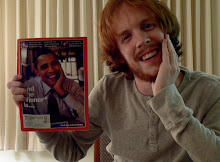Just fucking brilliant. He got it on the nose right there.

Saying goodbye to The Wire has been very, very hard for many, many reasons. However, for the sake of brevity, I will concentrate on two. The first, and most obvious, is that a show of The Wire's quality and craft is a rare thing on television. So rare, in fact, that The Wire will remain the only one ever to have been in existence until next Monday, at which point there will be none, with no salvation in sight.

I don't mean to put down the other shows television has to offer; I'm sure, however, that their feelings are a little hurt at this point. But it's no fault of theirs that The Wire is as good as it is. However, after five seasons of social criticism and increasingly complex urban drama, The Wire stands as a singularly epic work that offers no real comparison on television.

Another difficulty in The Wire's send-off is the emotional toll saying individual goodbyes to a richly developed cast of roughly forty major and minor characters can have on the viewer. Having spent years weaving through the lives of so many different individuals, the Wire's writers and cast created a world of ancient social institutions and flawed people being victimized by or operating within them. And damn it, things do not end well for most of them. (the show is, after all, described by its own creators as a Greek Tragedy)

This epic scope could have lead to a Brechtian utilitarianism in the massive cast, but, somehow, even the cameo roles on The Wire resonate with a lived-in history, as if these characters had been living for years in Baltimore before the cameras started rolling on. This narrative sincerity imbues every action, every piece of dialogue with years of back story, which is an effect often attempted but rarely achieved in television. So when we watch one character meet death by asking their murderer how their hair looks, it has the same emotional effect as a three monologue for an invested viewer. That small moment in the character's life holds the exact same weight as any other as far as The Wire is concerned, but that is an indicator of the show's natural understanding of its characters.

Instead of taking the moment for theatrical tactics, the show's writers chose to keep the scene intimate. This puts The Wire in the strange No Man's Land between the identities of social issue show and ensemble drama. So The Wire affects the viewer on these two levels, the societal and the personal.

Sigh. Anyways. I'm gonna head to bed. Good night all.
One week and counting until the end of The Wire.
Nathaniel Tyson

No comments:
Post a Comment